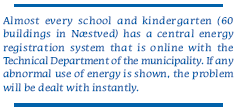 |
|
Saving energy at Nastved
|
In the good old days, before Ithe oil-crises
of the 1970's, not many people in Denmark cared about energy.
Energy was cheap. In recent times, however, consumption
of energy, and more importantly, rise of energy prises is
very much in focus.
Nastved is handling the question of energy
in two ways: 1. Production of energy, mainly heating and
electricity. 2. Saving energy in the public administration,
i.e. houses and institutions.
 Regarding
production of energy, all household-waste is incinerated
at the "Fasan" plant at Nastved. A total of 105.000
tonnes waste is collected and burned every year. In this
way waste is transformed into heating for approx. 11.000
houses in the town of Nastved. Apart from producing heating
a total of 250.000 MWh electricity is produced at the nearby
electric power station, also using heat from burning of
household waste. The plant is built and run by the municipalities
in the local area. Regarding
production of energy, all household-waste is incinerated
at the "Fasan" plant at Nastved. A total of 105.000
tonnes waste is collected and burned every year. In this
way waste is transformed into heating for approx. 11.000
houses in the town of Nastved. Apart from producing heating
a total of 250.000 MWh electricity is produced at the nearby
electric power station, also using heat from burning of
household waste. The plant is built and run by the municipalities
in the local area.
Saving energy is quite another matter. As
the largest quantities of energy are used in private households,
the municipality can only advise people how to use energy
in an economic way. This is done i.e. by showing how to
reduce use of electricity, heating and water. Good advice
is sent by mail to every household, and of course made public
through newspapers.
When it comes to buildings owned and operated
by the municipality itself, every year a budget and an account
is made, not only regarding the financial Thgures, but also
the consumption of calories and electricity. Almost every
school and kindergarted has a central energy registration
system.
Last, but not least, it should be mentioned
that there is a new development area at Nastved that will
be reserved exclusively for building of "zero-energy"
houses. These are houses, where you do not have the heating
turned on, as long as the outside temperature is above 0
degrees centigrade. In these houses the yearly consumption
of energy is approx. 3.000 kWh, which is only a third of
the normal consumption. This is achieved by using passive
solar heating and insulation.
by Mr Soeren Revsbaek
|
Further information:
Mr Soeren Revsbaek
Deputy Mayor and City Councillor
phone: +45 55 445076
e-mail: revsbaek@revsbaek.dk
|
|
|